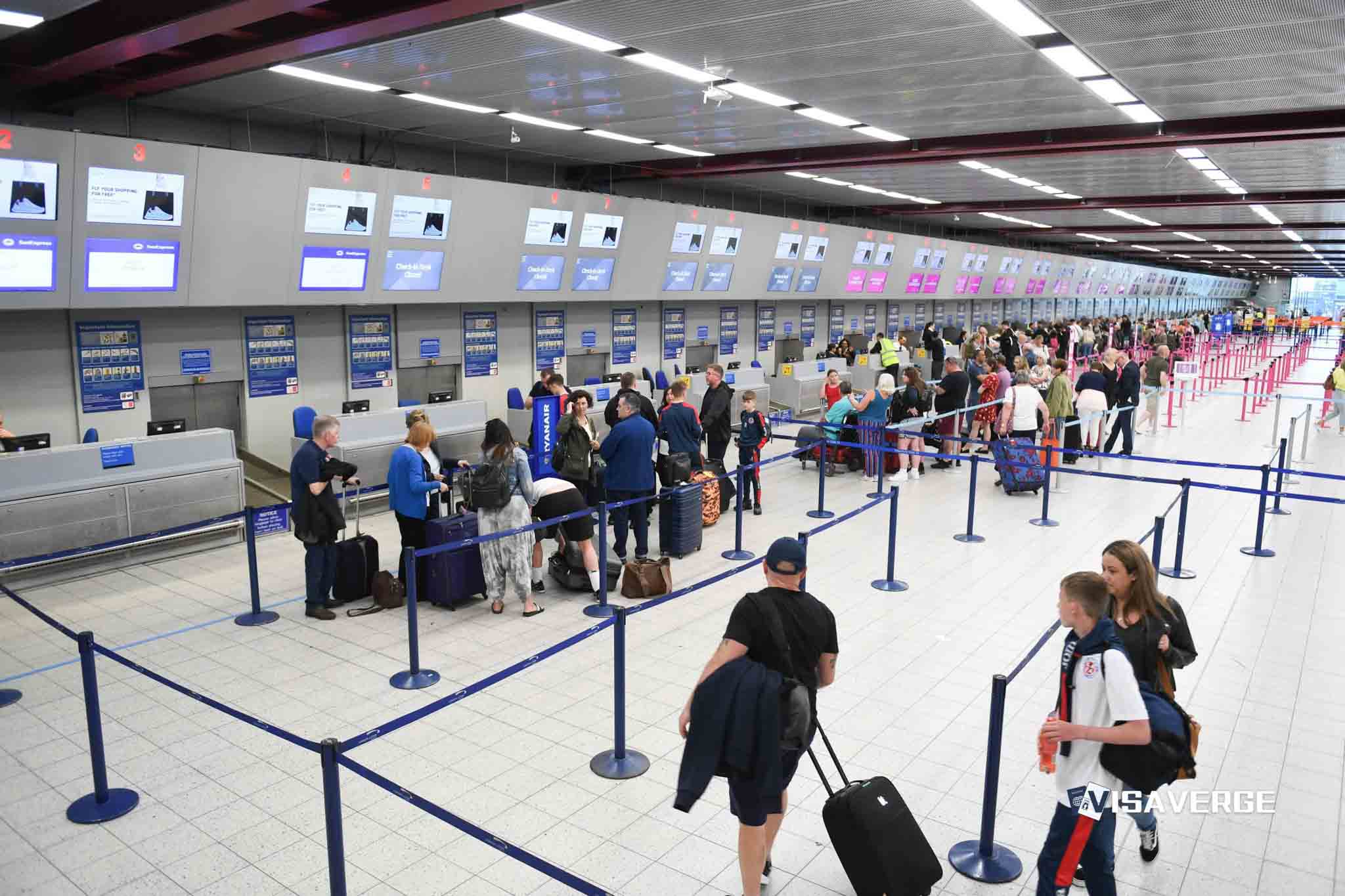Participation in EU Cultural Exchange Programs Post-Brexit: A Guide for UK Citizens
The fabric of cultural exchange between the United Kingdom and the countries of the European Union has been a tapestry woven with shared experiences and educational growth. However, in the wake of Brexit, many UK citizens are left pondering their place within these enriching EU cultural exchange programs.
Understanding the Impact of Brexit on Cultural Exchanges
Brexit has undeniably altered the landscape of international cooperation and movement for British nationals. For years, cross-border cultural exchanges have flourished under the EU umbrella, fostering understanding and collaboration. But after Brexit, UK citizens face new regulations and considerations when aspiring to take part in these initiatives.
Eligibility for EU Cultural Exchange Post-Brexit
One key concern is whether UK citizens retain eligibility to engage in these programs. As it stands, the conditions for British participation have evolved. While the UK is no longer an EU member state, it does not spell the end of all possibilities for cultural immersion and exchange.
Exploring the Opportunities for UK Citizen Participation in EU Programs

UK nationals interested in joining EU cultural exchange programs will need to navigate a changed array of rules and procedures. While eligibility may depend on the specific program or initiative, the UK continues to foster relationships encouraging cultural ties with European countries.
Erasmus+ and UK Citizens
For instance, the well-known Erasmus+ program, which enabled students to study across Europe, has seen its UK participation rights shift post-Brexit. The UK government has established the Turing Scheme to facilitate global study opportunities for UK students, placing a strong emphasis on worldwide exchanges.
Checking Visa and Entry Requirements for EU Cultural Exchanges
When considering participation in these programs, understanding the visa and immigration requirements becomes essential. Post-Brexit travel conditions mean that UK citizens might need to procure additional documentation, such as visas or work permits, to participate in long-term cultural activities within the EU.
Visas for Short-term Cultural Engagements
For short stays, such as attending cultural events or seminars, the rules vary by country, but often UK citizens can travel without a visa in the Schengen Area for up to 90 days within any 180-day period.
Work Visas and Residency for Prolonged Cultural Exchange
Longer engagements, such as internships or employment associated with cultural exchange programs, may require a work visa or residency permit. It’s important to consult the embassy or consulate of the destination country or check official resources like the European Union Immigration Portal for guidance.
Preparing for Participation in EU Cultural Exchange Programs
To equip oneself fully for taking part in EU cultural exchange programs, UK citizens should:
- Stay informed about the latest immigration laws and travel advisories.
- Consult the specific requirements of the cultural program in question.
- Research the entry and residency protocols of the host EU country.
- Ensure all paperwork, including visas or work permits, if necessary, is in order.
Embracing Cultural Enrichment Post-Brexit
While Brexit poses new challenges, it also opens the door for the UK to strengthen and diversify its cultural ties on a global scale. UK citizens aspiring to immerse themselves in EU cultural experiences will still find avenues to do so, albeit with different processes than before.
###
Participation in cultural exchange is a commendable endeavor, with the power to unite individuals from diverse backgrounds and perspectives. As UK citizens navigate the post-Brexit regulatory environment, their passion for cultural exchange remains crucial in preserving the cherished bond between the UK and Europe.
For the most current information and requirements specific to your cultural exchange ambitions, be sure to visit the official UK government website on travel and living abroad, as well as the websites of any EU programs or countries of interest.
In conclusion, UK citizen participation in EU cultural exchange programs may have encountered new hurdles, but opportunities still abound. With a proactive approach and thorough preparation, British nationals can continue to engage with and learn from their European counterparts in meaningful ways. The spirit of cultural exchange, after all, knows no borders.
Expert Insights
Did You Know?
1. The Erasmus+ program, which allowed UK students to study across Europe, has been replaced by the Turing Scheme post-Brexit. The Turing Scheme emphasizes global study opportunities for UK students, enabling them to explore exchanges worldwide.
2. While short-term cultural engagements, such as attending events or seminars, typically do not require a visa for UK citizens in the Schengen Area, longer-term engagements, such as internships or employment associated with cultural exchange programs, may require a work visa or residency permit.
3. The UK government continues to foster relationships encouraging cultural ties with European countries, despite no longer being an EU member state. This means that UK citizens still have avenues to participate in EU cultural exchange programs, albeit with new rules and procedures.
4. Diversifying its cultural ties on a global scale, Brexit provides the UK with an opportunity to not only strengthen its relationship with Europe but also forge new connections and collaborations with countries outside the EU.
5. Navigating the post-Brexit regulatory environment, UK citizens aspiring to participate in EU cultural exchange programs should stay informed about the latest immigration laws and travel advisories, research the specific requirements of the program they are interested in, and ensure all necessary paperwork is in order, including visas or work permits if needed.
6. Cultural exchange has the power to unite individuals from diverse backgrounds and perspectives. While the post-Brexit landscape may present challenges, the passion for cultural exchange remains crucial in preserving the cherished bond between the UK and Europe.
7. For the most current information and specific requirements related to cultural exchange ambitions, UK citizens should refer to the official UK government website on travel and living abroad, as well as the websites of EU programs or countries of interest.
Learn today
Glossary
- Cultural Exchange: The exchange of ideas, traditions, and experiences between people from different cultural backgrounds, often facilitated through programs, events, or initiatives.
- Brexit: The withdrawal of the United Kingdom from the European Union, which took effect on January 31, 2020, impacting various aspects of UK-EU cooperation and movement.
-
EU Cultural Exchange Programs: Programs and initiatives established by the European Union to promote cultural collaboration and exchange between member states.
-
Eligibility: The criteria or requirements that an individual must meet in order to be considered eligible for participation in a program or initiative.
-
Erasmus+: A well-known EU program that enables students to study, train, or gain work experience abroad in participating countries, fostering educational and cultural exchange.
-
Turing Scheme: A program established by the UK government as a replacement for UK students’ participation in the Erasmus+ program after Brexit, aiming to provide global study opportunities and emphasizing international exchanges.
-
Visa: A legal document issued by a country’s government that allows a person to enter, stay, or work in that country for a specified period or purpose.
-
Immigration Requirements: The specific rules, regulations, and documentation that individuals must fulfill or possess when entering or staying in a foreign country, such as visas, work permits, or residency permits.
-
Schengen Area: A zone in Europe comprising 26 European countries that have abolished passport and other types of border control at their mutual borders, allowing for free movement.
-
Embassy: A diplomatic representation of one country located in another country, responsible for providing services and assistance to its citizens, including visa processing and consular support.
-
Consulate: A branch or office of an embassy that provides various services, including visa and consular assistance, usually located in major cities.
-
Immigration Laws: The laws and regulations governing the movement, entry, and residence of individuals in a country, including rules related to citizenship, visas, work permits, and residency.
-
Travel Advisories: Official recommendations or warnings issued by governments to inform their citizens about potential risks or safety concerns when traveling to specific destinations.
-
Entry Protocols: The procedures and requirements that individuals must follow when entering a foreign country, such as passport checks, visa checks, and customs procedures.
-
Residency Permit: A document issued by a country that allows a foreigner to reside in that country for a specified period, usually requiring proof of accommodation, financial means, and other criteria.
-
Global Cultural Engagement: The involvement of individuals or groups from different countries in cultural activities, exchanges, or collaborations on a worldwide scale.
So, my fellow cultural adventurers, fear not! While Brexit may have thrown a few wrenches in our plans, the world of EU cultural exchange programs still eagerly awaits our participation. Remember to stay informed, dot your i’s and cross your t’s when it comes to visas and paperwork, and embrace the exciting new opportunities post-Brexit has brought. And hey, for more detailed and up-to-date info, head over to visaverge.com. Happy exploring, my friends! 🌍✈️ #CulturalExchange #BrexitImpact #EmbraceTheChange
FAQ’s to know:
FAQ 1: How has Brexit affected cultural exchanges between the UK and the EU?
Brexit has had a significant impact on cultural exchanges between the UK and the EU. While the EU has been a platform for cross-border cultural initiatives, UK citizens now face new regulations and considerations when participating in these programs. However, opportunities for cultural immersion and exchange still exist, albeit with different rules and procedures.
FAQ 2: Are UK citizens still eligible to participate in EU cultural exchange programs post-Brexit?
Yes, UK citizens can still participate in EU cultural exchange programs post-Brexit. However, eligibility may depend on the specific program or initiative. While the UK is no longer an EU member state, it continues to foster relationships encouraging cultural ties with European countries.
FAQ 3: What visa and entry requirements should UK citizens consider for EU cultural exchanges?
UK citizens should be aware of visa and immigration requirements for EU cultural exchanges. For short-term stays within the Schengen Area, UK citizens can usually travel without a visa for up to 90 days within any 180-day period. However, longer engagements such as internships or employment associated with cultural exchange programs may require a work visa or residency permit. It is essential to consult the embassy or consulate of the destination country and check official resources for guidance on specific requirements.
What did you learn? Answer below to know:
- True/False: After Brexit, UK citizens are no longer eligible to participate in EU cultural exchange programs.
- What is the name of the program established by the UK government to facilitate global study opportunities for UK students post-Brexit?
- What should UK citizens do to prepare for participation in EU cultural exchange programs post-Brexit? (Short answer)







